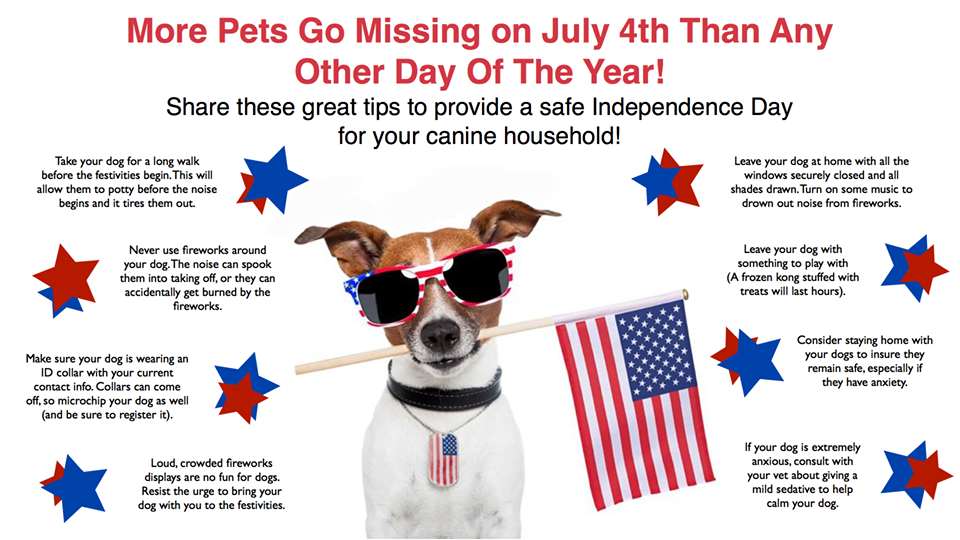This time of the year can send shivers down the bravest of canine spines. Not only do our pups have to endure booming thunder and lightning, they also have the bangs, booms and whistles of neighborhood fireworks that can start well before the 4th and last well after. It’s just not fun for many pets and their owners to hear bottle rockets in the street on an otherwise quiet evening – especially when our pets stare at us in anguish over the jarring sounds that justifiably alarm them.
Animals have a more sensitive sense of hearing than humans do, so noises that are a little loud to us are downright deafening to them. When panicked, our pets will do most anything to get away from a frightening situation. The following is a list of tips to help your pets feel safe and secure.
- If possible, it is highly recommended to desensitize your pet to loud noises before the festivities begin. Play a CD or visit YouTube for recordings of loud and scary noises such as firework explosions, trains, thunder etc. Start with the volume down low and gradually increase it to a loud level.
- Walk your dog at least 1 hour before the sun sets to prevent exposure to the fireworks. Take an extra-long walk to use up his extra energy if possible.
- Don’t leave your pet outside loose in the yard, kennel or tethered. They will have no place to go and the combination of restraint and noise will traumatize them even more.
- Never use fireworks around pets! While exposure to lit fireworks can potentially result in severe burns and/or trauma to the face and paws of curious pets, even unused fireworks can pose a danger. Many types contain potentially toxic substances, including potassium nitrate, arsenic and other heavy metals.
- Loud, crowded fireworks displays are no fun for pets, who can become frightened or disoriented by the sound. Please resist the urge to take them to Independence Day festivities, and opt instead to keep them safe from the noise in a quiet, sheltered and escape-proof area at home.
- Provide kennels or other “safe places” for your pets to hide. Cover the kennels with blankets to dampen the noise.
- Turn on the TV or radio to help drown out the noise of the fireworks to minimize your pets’ exposure to the noise. Keep the volume at a normal level; turning it up too loud may only increase your pets’ anxiety.
- Make sure all doors and windows are securely shut and locked. Shut all blinds and drapes to minimize visual stimuli. If necessary, put your pet in a room with no windows, such as the basement.
- If your pet gets excessively distraught by loud noises, tranquilizers or sedatives may be necessary. Contact your family veterinarian well in advance to discuss this option.
- Never punish your pet for its reaction to fireworks or other loud noises.
- Petting or reassuring your pet by saying “it’s okay” or “don’t be afraid” can actually reinforce her nervousness and fear. Instead ignore the behavior and try to redirect her attention with a favorite treat or toy.
- Act normally even though your pet is acting abnormally. Talk in a normal voice and do the things you would normally do at that time of the night, such as making dinner or doing the laundry. Your pets take their cues from you so if you act secure and confident so will they.
- Be prepared in the event that your pet does escape by keeping your pets’ IDs up to date! It’s a good idea for all your animal companions—even indoor-only pets—to always wear a collar with an ID tag that includes your name, current phone number and any relevant contact information. Collars can fall off, so microchipping your pet is also highly recommended. Contact us and file a Lost Report and be sure to include a recent photo. Putting your pets name and photo online may also facilitate the safe return of your pet.

